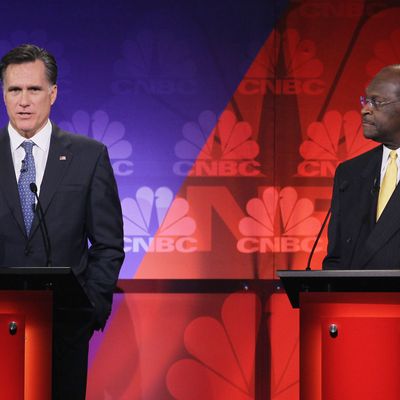
One of the many, many flaws of Herman Cain’s presidential candidacy was his complete lack of foreign policy credibility, and the most egregious example of which was, arguably, his refusal to spell out any kind of plan for the war in Afghanistan. “I’m not privy to a lot of confidential information since I’m not in government and I’m not in the administration,” he explained at one debate. Right … but this is the longest war in American history — surely you’ve had enough time think about how you’d want to handle it as commander-in-chief, broadly?
He didn’t, but it never really mattered because Herman Cain was never going to become president.
But Mitt Romney could very well become president, and he has about as much of a plan for American’s largest ongoing military effort as Herman Cain did. On Fox News Sunday two days ago, to take but the most recent example, Romney was asked by Brett Baier what he would do differently than Obama in Afghanistan:
ROMNEY: “Well, first of all, I would exercise leadership. And by that I mean I would speak with President Karzai. I would speak with President Karzai regularly, day-to-day … The president needs to be more engaged and interacting with — not only our commanders there but also with leadership in Afghanistan.”
Mmhm, okay, more leadership. And … what else? “Would you exercise the withdrawal?” Baier asked him:
ROMNEY: Well, the timing of withdrawal is going to be dependent about what you hear from the conditions on the ground. That you understand by speaking with commanders, as well as, of course, the people of Afghanistan and their ability to maintain their sovereignty and to have the capacity — to have a military that can stand up to the challenges they face.
The timetable, the guidelines that continue to be in effect, unless, of course, there are changes and conditions to suggest a faster withdrawal.
But recognize that, ultimately, the independence and security of Afghanistan is going to have to be secured and maintained by the Afghans themselves. We’re not going to stay there forever.
So it’s less than forever. Phew. But that’s about as specific as Romney could get. Could be a longer withdrawal, could be a faster one. It’ll just have to be a surprise!
Baier, one last time, tried to coax some semblance of an Afghanistan policy from Romney’s mouth:
BAIER: Your Republican opponents have a different tone they have been sounding. Speaker Newt Gingrich said we’re risking lives on a mission that may frankly not be doable. Rick Santorum said we either have to make a full commitment which he said this president has not done or we have to decide to get out sooner. And Ron Paul, of course, has maintained his long held position of withdrawing troops from Afghanistan immediately. So, are you taking a stand here while much of your party is souring on Afghanistan?
ROMNEY: Well, before I take a stand at a particular course of action, I want to get the input from the people who are there.
As little as Romney revealed in the Baier interview, he was equally non-committal in a chat with Wolf Blitzer a week ago:
BLITZER: So do you agree or disagree with Gingrich that the mission may not be, in his word, doable?
ROMNEY: Well, yes, there is no certainty in a matter of foreign policy of this nature, of course, and one recognizes that, as one goes into a conflict, but one over time collects information to see what progress is occurring, what setbacks are occurring. But you don’t make it an abrupt shift in policy because of the actions of one crazed deranged person. But, of course, you assess your prospects over time, again, given the input of the people closest to the — to the action. But at this stage, to say we’re going to throw in the towel without getting the input of General Allen, or actually making trips to Afghanistan and meeting with leaders there, and meeting with our commanders there and troops there, that wouldn’t make a lot of sense.
If there’s any difference between Herman Cain’s approach to Afghanistan and Mitt Romney’s, it’s subtle. Both seem to boil down to “Don’t worry about it, I’ll let you know when I’m president.” Perhaps the only major difference is that Cain’s inability to communicate his strategic vision for the war contributed to his reputation as an unprepared novice, while Romney’s refusal to do the same has done nothing to impede his path to the GOP nomination.





























